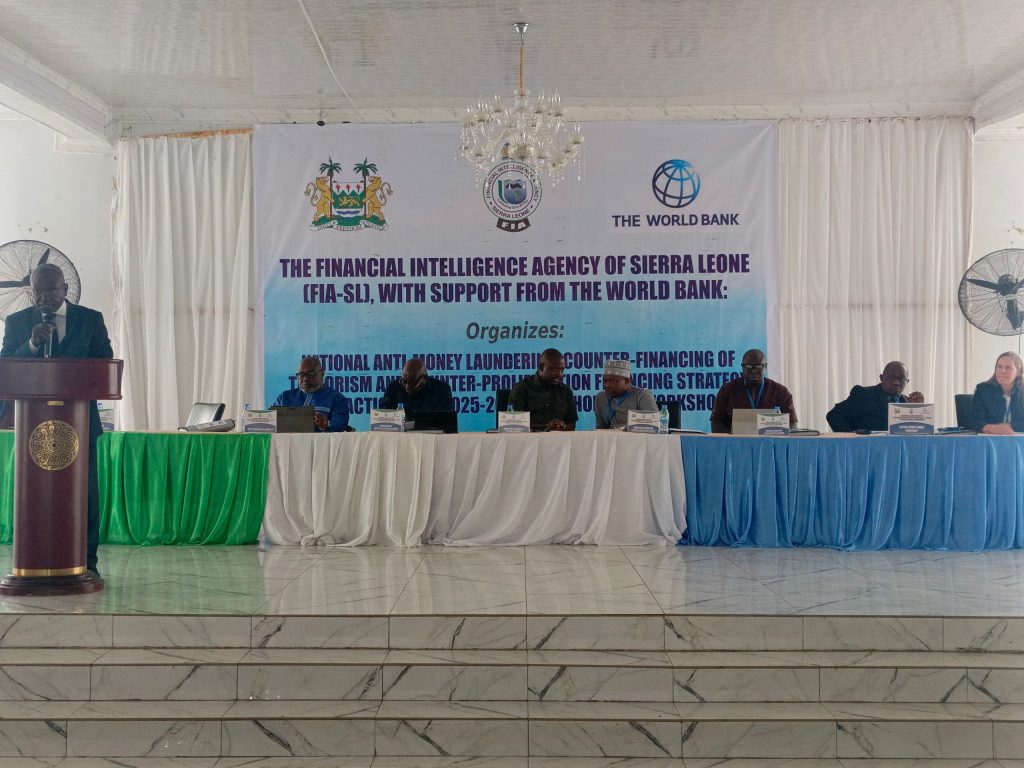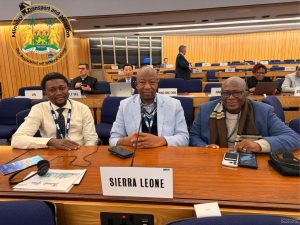FIA Workshop Aims to Finalize 2025–2029 Strategy on Combating Illicit Finance

The Financial Intelligence Agency (FIA) of Sierra Leone has launched a pivotal two-day stakeholders’ workshop in Bo City, aimed at developing a robust National Anti-Money Laundering, Counter-Terrorist Financing, and Counter-Proliferation Financing Strategy and Action Plan for the period 2025 to 2029.
This strategic exercise seeks to reinforce Sierra Leone’s legal, institutional, and operational framework to fight against money laundering, terrorist financing, and proliferation financing—financial threats that can undermine economic stability, national security, and international standing.
The workshop brings together a broad spectrum of stakeholders, including senior representatives from key ministries, departments, and agencies (MDAs) such as the Ministry of Finance, the Bank of Sierra Leone, the Anti-Corruption Commission, the Sierra Leone Police, the National Revenue Authority, and the Office of National Security. Representatives from the private sector, civil society, and international development partners are also participating in the deliberations.
A Multi-Dimensional Strategy
Delivering his keynote address at the opening session, FIA Director General David Borbor emphasized the need for a coordinated, forward-thinking approach to tackling financial crimes.
“This is not just a policy document—it is a call to action. The threats of money laundering and terrorist financing continue to evolve globally and regionally, and Sierra Leone must be proactive in responding. By implementing this strategy, Sierra Leone will enhance its defences against financial crimes, safeguard the integrity of its financial systems, and contribute meaningfully to global security,” Borbor stated.
He outlined the strategy’s pillars, which include:
- Legal and regulatory reforms to align with international standards, particularly those of the Financial Action Task Force (FATF);
- Institutional capacity building for enforcement and supervisory agencies;
- Technological innovation, including digital tools for financial tracking and intelligence sharing;
- Public-private partnerships for monitoring high-risk sectors;
- Enhanced international cooperation for cross-border investigations and asset recovery;
- Targeted enforcement actions based on evidence-driven risk assessments.
Aligning with the President’s Vision
This initiative directly aligns with His Excellency President Dr. Julius Maada Bio’s vision of ensuring that Sierra Leone does not become a haven for money laundering, terrorist financing, or other financial crimes. The President has repeatedly emphasized the importance of strengthening governance and institutional transparency to build international confidence and attract credible investment.
“Combating financial crime is a national imperative,” Borbor said. “This strategy complements our national development agenda and Sierra Leone’s commitment to regional and global frameworks such as ECOWAS GIABA and the United Nations conventions on financial crime.”
Building for the Future
The workshop is designed not only to draft the national strategy but also to foster dialogue, build consensus, and strengthen collaboration among critical actors in the fight against financial crimes.
Facilitated by national experts and technical advisers, the working sessions will include scenario planning, strategic gap analysis, and stakeholder feedback on proposed reforms. Outputs from the workshop will feed into a comprehensive five-year action plan with clear benchmarks, timelines, and indicators for implementation and monitoring.
International development partners including the World Bank, IMF, and European Union have also expressed support for the process and are expected to play a role in both funding and capacity-building aspects of the strategy.
A Commitment to Integrity and Reform
As the event continues in Bo City, there is a shared sense among participants that Sierra Leone is taking a decisive step toward becoming a regional leader in financial integrity and regulatory reform.
“What we are doing here is laying the foundation for a stronger, safer, and more accountable financial future,” Borbor concluded. “And that future begins with collaboration and a shared commitment to justice, transparency, and national progress.”
The workshop will conclude with the presentation of a draft strategy for validation, which will later be submitted to the Cabinet for approval and national rollout.





